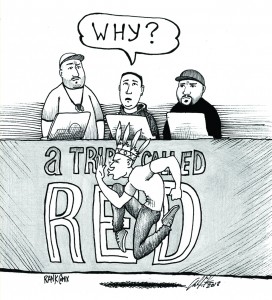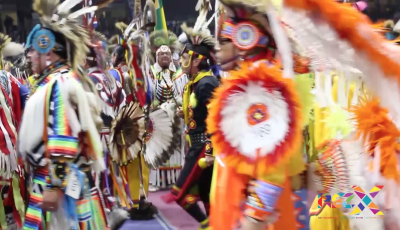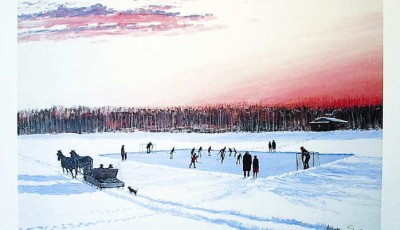RezXclusive Interview: A Tribe Called Red

Rank Comix by Adam Martin
Music is a universal language for all people. It reaches the masses and does not discriminate. In a critical time of change for Indigenous people, the Idle No More movement has unified and strengthened. A Tribe Called Red is one of the groups that have emerged in the music scene with the help of the movement. Based in Ottawa, Ontario, the group consists of three DJs – Ian “DJ NDN” Campeau, Dan “DJ Shub” General and Bear Witness. In a recent interview with Bear, he discussed the inspiration for the band’s name, how they willingly combat stereotypes of First Nation peoples, and how their Indigenous culture contributes to their music.
RezXSouth: What is the inspiration behind the group’s name?
Bear: The group’s name is inspired by ‘A Tribe Called Quest’, who were a protest band in the 1990’s. The ‘Red’ is considered a general term for describing Indigenous nations. RezXSouth: How do you describe your music? Was there a certain audience you were hoping to attract?
Bear: (We call it) ‘powwow-step’, a style of contemporary powwow music that urban First Nations in the dance club scene could relate to. It’s a mixture of powwow drumbeats, traditional singing and electronic. We wanted our music to relate to all Indigenous people, the ones on-reserve or living in small communities, (as well as) in the cities.
RezXSouth: How did you get your sound?
Bear: Most of our sound comes from DJ Sub, as he usually comes up with stuff. Then we’ll sit down together and collaborate. Unless of course we have a certain song or purpose to write for and we’ll work closer together for the specific sound. It all starts with the drum; it sets the song on a path in itself. Then after that, the sounds are established through building themes, BPM (Beats Per Minute) and layering.
RezXSouth: Your music is coming at a time when pride is being restored to Aboriginal Youth. Do you think you have been a part of this?
Bear: The main reason for the group’s existence was to create something specific to Aboriginal people.
RezXSouth: How have Indigenous movements like ‘Idle No More’ inspired you creatively?
Bear: We wanted our music to relate to all Indigenous people, the ones on-reserve or living in small communities, (as well as) in the cities. We got our start initially DJing in clubs. But with all the support we were receiving, we just wanted to give back to the people and that’s where the music was born. Aboriginal people need (music) to identify with and this pow wow- step is something that we can all relate to because it’s our own. We never expected our music to be received the way it has been, we were simply doing it for our people. But once it moved out of that, we realized that it also spoke to others, which is great.
RezXSouth: I understand you’ve had problems with people attending your shows in headdresses and face paint how do you deal with this type of cultural appropriation? Bear: It’s interesting to know that non-aboriginal people think that while they’re dressing in traditional style clothing, like headdresses for instance, they truly believe that they are simply celebrating the culture by doing this. But when we take the time to explain to them why it’s improper and can be construed as disrespectful, (non-Indigenous people) have no problems with not wearing their costumes.
Interview by By Geraldine Carriere / Comic by Adam Martin for Rank Comix
CHECK EM OUT ON-LINE @ WWW.ATRIBECALLEDRED.COM
Story originally published in RezXSouth Summer Premier Edition, July, 2013




